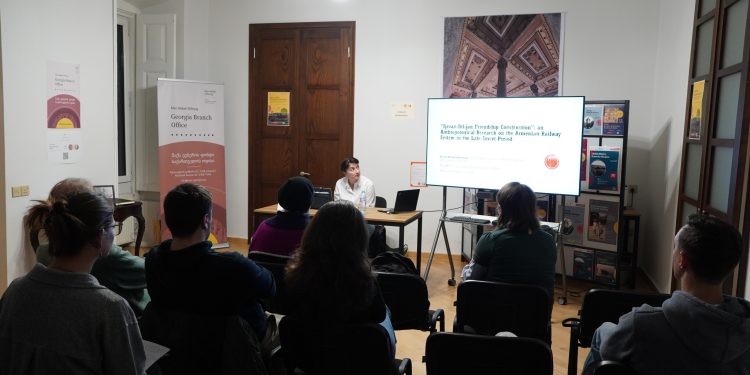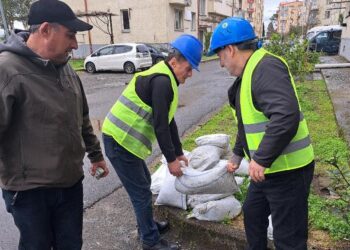The Max Weber Stiftung Foundation Georgia Branch Office educates the public through monthly presentations, and supports researchers by providing information about the South Caucasus and Germany.
Launched in 2023, the Georgia Branch Office is a part of the wider Max Weber Stiftung Foundation. It’s one of the leading agencies that supports German research in humanities and social sciences abroad. Its first institution was created in Rome in 1888 as the ‘German Historical Institute in Rome.’
There are 11 autonomous institutes worldwide that serve as a bridge between the host country and Germany. This creates an international dialogue and collaboration for a network that contributes to the internationalization of science. The Georgia Branch Office offers many opportunities for the public, among them discussions on history, scholarships, internships, and chances to participate in conferences locally and abroad.
The office also offers the public a digital library, with e-books, electronic databases/info systems, e-journals and scientific articles. The only requirement to use them is to register an account at the office.
Once or twice a month, the office holds a lecture on a certain topic related to the South Caucasus. The Georgia Branch Office is based in Tbilisi, but also hosts guests and covers topics relating to Armenia and Azerbaijan. On November 27, a talk was given by PhD Student Eviya Hovhannisyan, who is studying at the Institute of Archeology and Ethnography NAS RA in Armenia. It was titled ‘Ijevan-Dilijan Friendship Construction: An Anthropological Research on the Armenian Railway System in the Late Soviet Period.’ In Armenia, the railway system is independent from the state, and is still owned by Russia.

Hovhannisyan explained her pilot study, and about how the Transcaucasian railway system was created by Russia as a strategic way of connecting the Black and Caspian seas. During the early and mid-20th century, the railways brought Armenia, Azerbaijan, and Georgia together through trade, and since the railway system generated its own income, it was a great way for the regime to maintain control over the three nations.
The idea for the Ijevan-Dilijan rail line was first brought up in the late 19th century, but due to the landscape of the region and the unknowns of taking on such a ‘megaproject’, construction didn’t commence until 1971. The railway took 15 years to construct and only ran until 1994, due to the Karabakh War and damage from a landslide. Hovhannisyan noted that it was under construction longer than it was running, but emphasized that it did offer benefits during its short run.
“It gave people the opportunity to try out new professions, such as tunnel construction, track maintenance, managing the stations, and others,” Hovhannisyan noted. “Armenia, back then, didn’t have these jobs in any institutions: they went to Tbilisi to learn them.”

There were around 25,000 people who worked on the creation of the railway, and since it took 15 years to complete, those who came from abroad – Belarus, Ukraine, Georgia, and other countries – to work on it, never left; choosing to stay and start families. Hovhannisyan mentioned that a former railway worker told her that the salaries were high then, 300 to 350 rubles, but there was nowhere to spend the money, because there was no infrastructure around the railway, only that which was specially built for the workers.
Such projects were good for the USSR, because they were an easy source of propaganda, Hovhannisyan noted. Many poems from workers and posters were produced that celebrated the positivity of creating such infrastructure.
The first train ran on August 9, 1986, from Ijevan to Dilijan, and then on to Kakavadzor. The headline the following day in the newspaper, Soviet Armenia, celebrated the ‘major achievement and progress’ for the country’s economy.
“…and let the joy of the local residents of the Aghstev Valley be undimmed, let them not worry that the whistle of the train may disturb their night’s sleep. If they see what this railway will bring to Armenia, the train whistle will sound like a sweet lullaby to them. […] This railway is not very long, but its benefits are obvious. It will reach the Pacific Ocean on one side and the Baltic coast on the other. It is endless, because it will connect the steel veins of the endless Soviet Union. This is our strength.”
The line has not been active since it ceased operating in 1994. However, it is still under ownership, and certain stations have watchmen to ensure the stations and line remain intact. Hovhannisyan said some of the villages on the line house Azerbaijani refugees, while other areas have been abandoned and looted. In Iijevan, the railway runs under the city through a tunnel, where children play even though the electricity is still on.
According to Hovhannisyan, there was discussion from the government about what to do with the railway after the Second Karabakh War. However, there are not yet enough funds to take on the enormous amount of renovation required. Hovhannisyan claims it would be in the interest of Armenians to have it running again, because it would boost the economy, strengthen growing relations, and open communication with neighboring countries.
The fascinating talk took place in a room in the Max Weber Foundation Georgia Branch Office, with light refreshments offered before and after. All of the monthly talks are in English, with the exception of the upcoming one in December, due to the speaker’s language proficiency. Prior to each lecture, there is a place to register on the office’s website (mwsgeorgia.hypotheses.org) to secure your seat.
By Shelbi R. Ankiewicz














